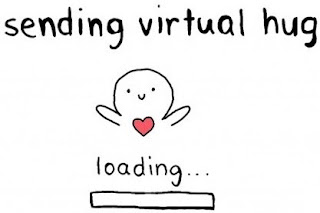“When your healthy self is strong enough to deal with all that comes your way in life, your eating disorder self will no longer be useful or necessary."
-Carolyn Costin, 8 Keys to Recovery from an Eating Disorder
When I first read this, I was not in a good place. I was standing in the office of the university's therapy department looking through their small self-help library and wondering if any of the other students would notice that I was carrying a stack of books related to anorexia and body image. But as I got better, the idea of my "healthy self" started to make more sense. Somehow, following my meal plan and committing to being honest with myself, my care team, and my family enabled me to get in touch with my healthy self, and having "met" her, I am now able to call on her to help me with my relapse.
So . . . who is this mysterious "healthy self"? And what can we do to better hear her/him/them?
Personally, I find it helpful to imagine my healthy self as an older, wiser sister version of myself--someone who can see through the eating disorder's lies. And sometimes I even imagine her as my inner child--someone who I can take care of the way I take care of my students or siblings. When I'm tempted to listen to the eating disorder voice, I pause and ask myself what my healthy self would do. What would--to quote Marie Kondo--"spark joy"?
Becoming a teacher has made a huge difference in my recovery journey, and I really credit my teaching job for saving my life. Being with my students "spark[s] joy"--even on the hardest days--because it gives me something truly meaningful to focus on that exists outside of eating disorder thoughts.
Other things that can be really helpful for finding joy outside of your eating disorder include . . . .
1) Reading. I'm currently working through All the Light We Cannot See by Anthony Doerr--a beautiful, powerful, tragic book that gets me out of my worry trails and into my heart space.
2) Watching a long-running television show. If you watch an episode every day/few days/week, that will make the show last longer, and the characters can become friends that remind you that there's more to life than eating and exercising. I really like Felicity, LOST, and Party of Five.
3) Engaging in joyful movement. I had a really, really bad exercise addiction, so I fully recognize that movement may not be for everyone. And finding ways to cope with anxiety that don't involve movement is essential to fully recovering. But if movement is something you'd like to explore and that you feel would be safe (i.e. not triggering or physically hurtful) for you, I recommend checking out Yoga with Adriene or Mimi Kuo-Deemer on YouTube or blasting music and having a dance party.
4) Just listening to music! I love Florence & the Machine, The White Stripes, Lykke Li, Bon Iver, Kate Bush, and The Cranberries. I'm also going to dedicate a whole post to songs that have helped me in recovery :).
5) Trying foods you used to love! I can't tell you how happy I felt having an almond butter and jelly sandwich in my lunchbox for the first time in five years when I started "recovering for real" at the end of 2019. And while I'm gluten-free due to gluten intolerance, I discovered the Kinnikinnick version and had my first "Oreos" in over seven years today! And it was really fun!
6) Picking up old hobbies (or finding new ones). I used to write all the time. I started writing "books" when I was four, and throughout elementary and middle school, I was always thinking of stories and characters and how to bring them to life. I stopped writing in the deepest parts of my eating disorder because all I could think about were food and exercise, but now I'm writing again, and it feels really good to finally be doing heart-centered activities again.
I'm sending everyone love, hugs, and the Force (I'm a bit of a Star Wars geek). What activities can you incorporate into your day that might help you get in touch with your "healthy self"? Could you call a friend? Plan a movie date with your cat? Whatever you do, remember that you are strong enough to get through your worries. You've got this.
<3 Frances
Images from Giphy.





